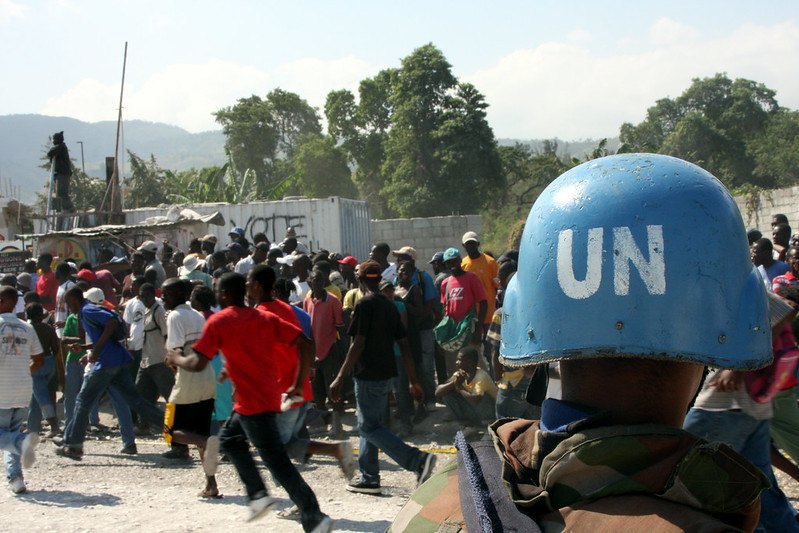France Called Out for Ignoring Plea to Repatriate Citizens in Syria
While cautious in its legal reasoning, the European Court of Human Rights ruling was a limited victory for advocates of repatriation. States are constrained by their human rights commitments—even on the most sensitive national security issues.

Three years after the military defeat of the Islamic State in Syria, thousands of foreign women and children remain in de facto detention camps run by the former Kurdish Syrian Democratic Forces (SDF), despite their and their families’ pleas for their states of nationality to take steps to repatriate them. Although the first cases arose more than five years ago, European states (as well as Australia, and Canada) have to this day still largely proved reluctant to acknowledge any obligation toward their citizens whose choice to join the Islamic State made them pariahs at home. Although the repatriation issue stopped making the headlines, it came back under the spotlight last week due to a highly anticipated ruling by the European Court of Human Rights (ECtHR). In the case H.F. and Others v. France, released on Sept. 14, the ECtHR found France in violation of its treaty obligations, dealing a blow to the French government’s long-standing policy on the matter and a victory to families and human rights advocates.
Calling Out France Without Recognizing a Duty to Repatriate Its Citizens
The case was introduced in 2019 and 2020 by two separate families who had pleaded with the French government to repatriate their daughters, who gave birth to one and two children, respectively, after traveling to Islamic State-held Syrian territory in 2014–2015. In the absence of any response from the French government, the families took the authorities to court but saw their cases dismissed. French judges determined that they lacked jurisdiction to second-guess a diplomatic and national security decision of the state. In their subsequent application to the ECtHR—the influential regional court founded in Strasbourg, France, by the 46-nation Council of Europe to ensure the implementation of the 1950 European Convention on Human Rights (ECHR)—the families, acting on behalf of their detained relatives, most notably argued that:
- By refusing to repatriate its citizens, France had breached its obligations under the prohibition of inhuman or degrading treatment given the humanitarian situation in the camps.
- France was concurrently violating their daughters’ rights and the rights of their daughters’ children to enter the territory of their state of nationality—a well-established human right, guaranteed under a protocol to the ECHR.
- Their right to an effective remedy was violated by the impossibility to challenge the French authorities’ inaction.
As the first ruling on this issue by a supranational court, the case’s conclusion was long anticipated by human rights lawyers and advocates. It was also signficant because the European judges had to address thorny legal questions, most notably of jurisdiction, on an exceptionally sensitive topic touching on states’ jealously guarded counter terrorism and national security prerogatives—with the added pressure of extensive media coverage and unsympathetic public opinions.
As evidence of the stakes, the case was sent to the Grand Chamber—the highest-level formation of the court, consisting of 17 judges instead of the usual seven for a regular chamber. Seven European governments (Belgium, the U.K., Denmark, the Netherlands, Norway, Spain, and Sweden) had submitted observations—the equivalent of amicus briefs—in support of the French government’s arguments. Meanwhile, a host of human rights advocates—including the Council of Europe’s commissioner for human rights, France’s own national human rights commission, and two U.N. special rapporteurs—had submitted similar observations in support of the applicants’ claims.
Almost a year after the Sept. 29, 2021, public hearing, where judges had grilled the parties on their legal arguments, the Grand Chamber ruled 14-3 on Sept. 14 that France had indeed violated its international obligations and should therefore change its practice in similar cases and reexamine the applicants’ repatriation requests. The decision dealt a major blow to France and its argumentation, even though the French authorities were quick to downplay its significance by highlighting that they had already modified their policy in recent instances.
For the families and humanitarian actors, the main takeaway was that France had been called out not for its inaction per se but, rather, for failing to set up a formal mechanism to review individual requests of repatriation that would incorporate sufficient guarantees against arbitrariness, in spite of its positive obligations under the right to enter one’s own country. The court therefore did not rule that France had an actionable obligation to repatriate its citizens or even provide consular protection. Nor did it rule that, in this particular case, the mothers and their children should be repatriated—unsurprisingly leaving this contextual analysis for a later domestic assessment. Still, this meant that, as opposed to what many governments had argued, this issue was not merely a diplomatic or national security one on which they were completely free of any independent scrutiny. Therefore, although a modest victory for the families, the ruling was nonetheless an opportunity to hold the government to account after years of silence. But, most importantly, the case opened the door for a second chance to have their family members brought home—hopefully through a more balanced procedure and in a less heated and potentially more indulgent political environment.
For lawyers who have been watching the case, the judgment is also very interesting in several ways. Many applicants, intervening parties, and academics had already argued in favor of extending France’s extraterritorial jurisdiction. They made this argument on the basis that the individuals’ suffering abroad was the indirect result of administrative decisions—or lack thereof—at home; or France, through its cooperation with the Kurdish authorities, had exercised sufficient control so as to make it somewhat responsible for the suffering occurring under the latter’s hand. This would have meant that France could be held accountable under the prohibition of torture, inhuman, and degrading treatment, which by all accounts has evidently been violated in the camps.
Despite these interesting arguments, the court unsurprisingly refrained from acknowledging such an extension of the traditional understanding of extraterritorial jurisdiction—a move that would have been a small revolution in the legal world and would have had even farther-reaching consequences much beyond the scope of this case, according to France and the intervening states. Rather, the court reaffirmed its long-standing standard relying on “effective control” over a territory or direct “authority and control” over individuals, observing that those circumstances were not met in this case. In doing so, the Strasbourg judges proved more conservative than the Geneva-based U.N. Committee on the Rights of Child, which had adopted a broader interpretation while ruling on the same issue of repatriation.
After finding that “nationality was not an autonomous basis of jurisdiction,” in order to be able to find a violation of the right to enter one’s own country, the court had to establish a “jurisdictional link” between France and the individuals in Syria. This link, the judges argued, did not result from the nationality nexus alone but, rather, from a combination of “special features.” These special features included the fact that the applicants had submitted several requests for repatriation to the French authorities, while their daughters and grandchildren were facing “real and immediate threats to their lives and physical well-being” and were unable to leave the camps without the support of their state of nationality. This analysis and standard for finding a “jurisdictional link” is quite interesting although a little bewildering. In fact, some of the judges criticized it in a separate opinion, and one can wonder how it could apply elsewhere in the future.
These two conspicuous aspects will need to be addressed elsewhere, but they clearly open the door to interesting legal conversations. The relevance of those conversations will necessarily go beyond the borders of the Council of Europe since they feed into the broader debate on extraterritorial jurisdiction and the current widespread—although not undisputable—assumption that jurisdiction in international law is primarily territorial.
A Clear, Yet Limited Condemnation of France’s Policy
For all the reasons mentioned above, the judgment did not constitute a massive legal turnaround. Its conclusion was rather limited. France only failed to have an established and nonarbitrary process for reviewing repatriation requests, and the court introduced so many cautious contextual considerations that it is, at this point, hard to assess what will be the ultimate legal significance of the reasoning in the long run.
However, from a policy and public perception perspective, the decision is a clear condemnation of France’s action—or, again, lack thereof—with respect to the fate of its citizens in Syria and Iraq. The judgment implies that this issue could not be considered merely one of national security or diplomacy, as many western states had suggested—an approach that exemplifies the trend of shrinking individual rights when in conflict with security policies. Both aspects have been a continuous concern in the West since 9/11 and the launch of the “war on terror.” Indeed, policies advertised as countering terrorism have been involved in entrenching exceptional legal regimes and exceptions in domestic legal systems, posing a potential existential threat to the rule of law.
This decision is unlikely to result in the sudden repatriation of all the European citizens currently in northeastern Syria. But, by forcing states to implement more systematic, thorough, transparent, and impartial mechanisms to assess requests of repatriation—and allowing the families to challenge states’ arguments—the judgment might result in some additional repatriations in the near future. If other states wish to avoid the public shaming France experienced, they could prove more willing to listen to the arguments of advocates of large-scale repatriation.
More broadly, it also reminds states that they do have an enforceable responsibility to abide by the principles of the rule of law, even when the main effects are produced abroad. It also shows that despite a growing reluctance by courts to second-guess states’ national security and counterterrorism policies, and despite the European court’s own difficult dance between maintaining its fragile legitimacy while safeguarding the Convention, there are limits to how much discretion the court is willing to give states. This echoes the famous Nada and Al-Dulimi cases on Security Council-mandated individual sanctions.
Outside of Europe, ECtHR rulings have had some influence in other jurisdictions; it will therefore be interesting to see whether other courts, supranational or domestic—or other governments—will take the court’s reasoning into account and follow the steps it recommends in their own handling of the Syrian repatriation conundrum.
While not a complete game changer, the judgment does somewhat put an end to a half-decade of uncertainty and opacity on the matter and reminds states to approach these people’s situation with similar human rights concerns as they would have within their territory. At a time when the protection of human rights seems to be under attack, it is also a reminder that states’ international human rights obligations do constrain them and protect their citizens against abuses, even in high-stakes areas like national security and even when the outcome is not particularly popular with public opinion.



.jpg?sfvrsn=3f72484e_5)
.jpg?sfvrsn=104df884_5)
